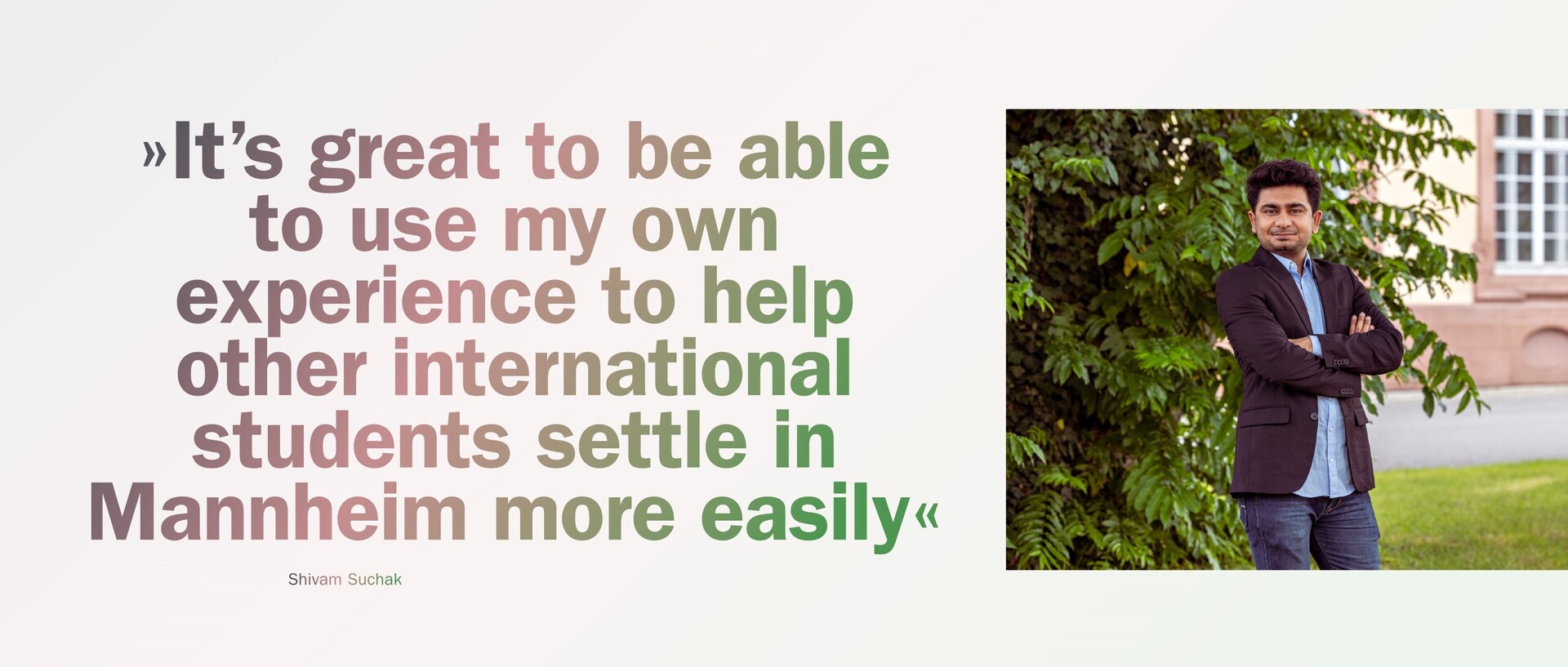Help for International Newcomers
2,000 students in 16 years: That’s the number of international degree-seeking students and local study peers that the International Office has matched so far. Study peers help incoming internationals get started in university – and often they become friends as soon as they meet at Mannheim central station.
Shivam Suchak is from Gujarat, India. A while ago, he flew to Germany to pursue a master’s degree in data science at the University of Mannheim. His plane landed on time at Frankfurt airport. He followed the signs to pick up his luggage and found his way to the long-distance train station. From there, he took the train to Mannheim. After arriving at the central station, he needed to find out how to get to his accommodation.
Every year, around 400 international degree-seeking students experience something like Suchak when first arriving in Mannheim. To help them settle in a foreign city, the International Office of the University of Mannheim launched the Study Peers Program for international degree-seeking students in 2008. “I hadn’t read the information about the program, that’s why I was alone in Mannheim at the beginning,” recalls 23-year-old Suchak.
An easier start
Looking back, he says: “It all works out eventually, but it’s not easy. You don’t speak German very well, you must find a way to get to Mannheim, you need to have a valid visa, find a place to live prior to your arrival and then register with the authorities.” When asked later whether he would like to support international students himself, he didn’t think twice. “Why not? It’s great to be able to use my own experience to help other internationals settle in Mannheim more easily,” says Suchak. He filled in a form at the International Office asking him about his country of origin, his degree program and his foreign language proficiency. Based on his responses, the International Office matched him with his first student.
Suchak is now in his fourth semester and serves as a study peer for multiple students. One of them is Minghao Lei from Wuhan, China, who is in the second semester of his master’s degree in business informatics. He and Suchak exchanged emails even before his arrival in Mannheim. Lei had never been to Europe or abroad on his own before. “Through the program, I had help with visa issues and finding a place to live, which was great. And it was a great opportunity to meet new people,” says 26-year-old Lei. Another plus: His study peer is founder of the Google Developer Student Club (GDSC), a student organization whose membership now includes Lei as well.
At GDSC, they pursue their passion for tech and tech innovation together. “I’m doing my master’s in Mannheim because of the program’s emphasis on technology. GDSC allows me to deepen my skills, which is why I’m heavily involved in the club. But I also go there because I meet a lot of people who study something else – and because we mainly speak English,” says Lei, chuckling. He does learn German, but it’s not that easy, he admits. He meets his study peer both at the club and in the classroom: Although they are enrolled in different programs, they are taking a few courses together.
New program underway
It isn’t just international students like Suchak who can become study peers, the program is open to all students. Every year, an average of 100 study peers and incoming internationals are matched. “We consistently receive very positive feedback about our program and repeatedly hear that some students are still in touch years later and have become close friends,” says Solrun Graham-Parker, who is responsible for the academic success of international degree-seeking students and the “Made in Mannheim: FIT for Studies” program at the International Office.
The program is part of the “Made in Mannheim: FIT for Studies and Career” project, which was approved in April and will receive 800,000 euros in funding from the German Academic Exchange Service (DAAD). Graham-Parker and her colleagues plan to use some of the money to expand the existing international Study Peers Program. Beginning in the 2024 fall/
As a seasoned study peer, Suchak no longer needs a preparatory meeting. Moreover, his mentoring is no longer limited to his official role as a study peer, he also gets private requests for help from friends. He also uses his student organization to disseminate information about the program: “When the International Office calls for new peers, I also approach GSDC members to see if they would like to get involved,” he says. Lei, too, can see himself supporting new students in Mannheim: “I like to help others, and I met so many new people through the program that I’d like to pass that on.”
Want to become a local study peer? For more information see our study peers website.
Text: Luisa Gebhardt / August 2024
The interviews for the articles in this section took place in May and June 2024. It is possible, therefore, that officeholders have changed between the editorial deadline and the time the magazine went to print, or that some information is no longer up to date.
